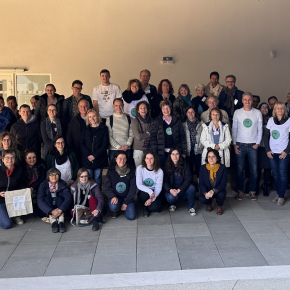Mathematics libraries in France
Mathematics libraries are a unique feature of the French research landscape. Structured as a nationwide network, they are the focus of a common reflection on documentation, and all share a common priority given to the quality of their scientific content. An article co-authored by members of the Réseau National des Bibliothèques de Mathématiques (RNBM).
"The library is the mathematician's laboratory", wrote Odile Vigeannel-Larive in 2002, underlining both the essential nature of bibliographic holdings in the field of mathematics and their longevity. The long history of mathematics is well known, from the role played by a problem by Pappus of Alexandria for René Descartes in the 17th century, to the influence of the Disquisitiones arithmeticae, published by Carl Friedrich Gauss in 1801, on the work of Emmy Noether and André Weil in the 20th century, or on that of Manjul Bhargava in the 21st century.
"But this long duration is not just about the scientific content of the texts, it's also about the recognized importance of relations between librarians and scientists throughout history," explains Catherine Goldstein, director of research at Insmi and a historian of mathematics. In France, for example, theAcadémie des Sciences first met in a library in the 17th century, and included among its members Pierre de Carcavi, librarian to Colbert and later to the King, alongside mathematicians such as Christian Huygens and Gilles de Roberval. Henri Poincaré, professor of mathematics at the Faculté des Sciences, and Charles Henry, librarian at the Sorbonne, respectively president and vice-president of the Congrès international de bibliographie des sciences mathématiques of 1889, worked together to ensure that documentation was better classified and better informed by international research.
A survey of the place of science in French libraries in 1905 also recommended fruitful exchanges between librarians and scientists. Manuscripts, then printed works, have been joined by an ever-increasing number of articles in specialized journals, and by digital documentation, with renewed conditions of durability, categorization and transmission. The promotion of mathematical heritage and a recent interest in the materiality of science, in all its diversity - texts, symbols, models, papers, algorithms, illustrations, files - have added to, but not replaced, the now classic tasks of collecting, indexing, preserving and making documents available.
The French National Network of Mathematics Libraries
The Réseau National des Bibliothèques de Mathématiques (RNBM), or French National Network of Mathematics Libraries, is both a network of libraries and a network of librarians, and has always involved scientists. Born informally in the 1970s, it has grown over time thanks to the efforts of the CNRS, the Société Mathématique de France (SMF), French Mathematical Society, and the mathematics research community in general. The RNBM celebrated its 40th anniversary at the Centre International de Rencontres Mathématiques (CIRM), International Center for Mathematical Encounters, in November 2023, on the occasion of its biannual national training event.
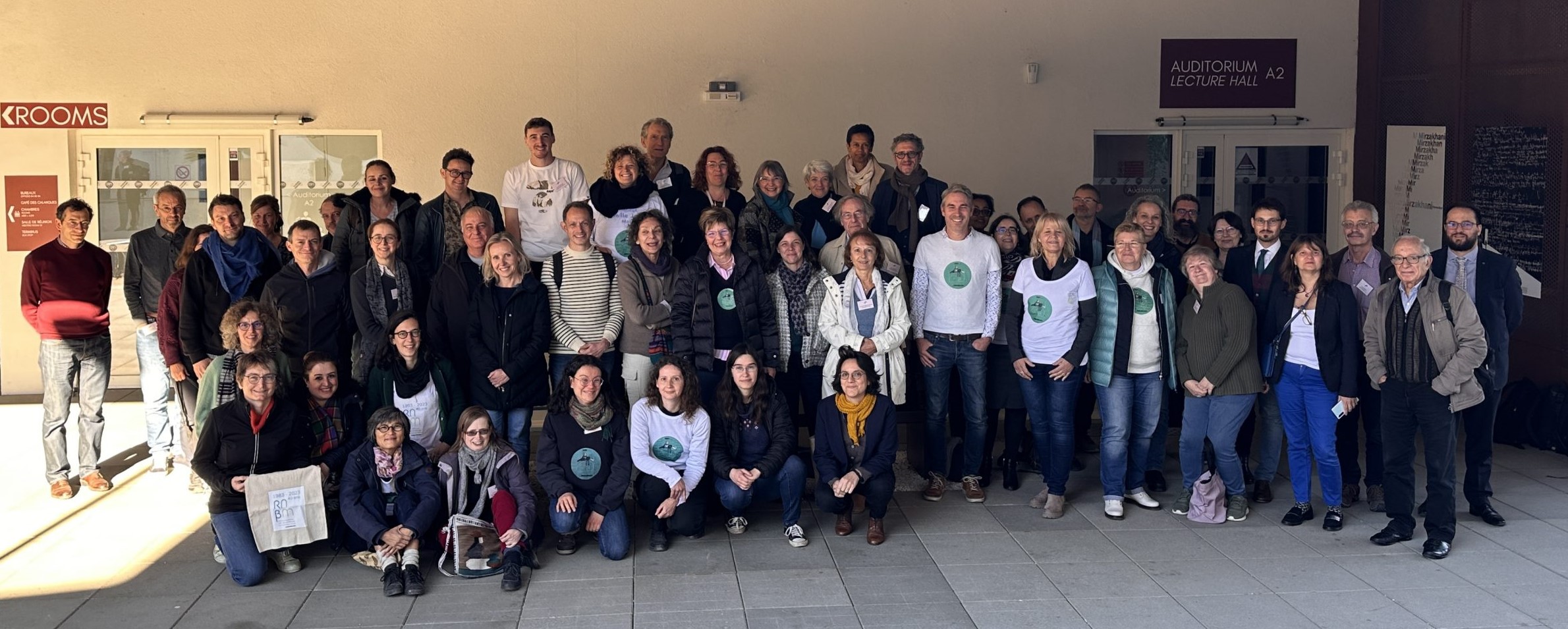
"The RNBM is an exception in the landscape of disciplinary libraries in France. The network logic brings enormous benefits to both librarians and scientists, and has also enabled the implementation of major national tools such as the merged periodicals catalog (CFP) and the shared conservation plan (PCMATH)," says Elisabeth Kneller, director of the RNBM and administrative manager of the Jacques Hadamard library in Orsay. " The RNBM is also the fruit of the national structuring of the French mathematical community, notably through its learned societies," she adds. The RNBM is run by both librarians and scientists.
The RNBM coordinates mathematics documentation policy in France. It is responsible for preserving and promoting our documentary heritage, on paper and electronically, and ensuring that access to it is maintained over the long term. It helps to pool documentation, and to better negotiate the acquisition of electronic resources within the framework of national licenses. The RNBM is a privileged contact in France for all those involved in mathematical publishing.
The RNBM and its libraries benefit from the constant support of Insmi, but each library must deal with the logic of its local supervisory bodies in particular.
Among the major issues currently preoccupying the RNBM are :
- the considerable development of electronic resources, the decline of paper, and the impact on modes of access, financing and long-term preservation;
- the development of new modes of publication, notably Open Access, and the new economic strategies of publishers;
- transformations in the profession of librarian and library usage, as well as pressures on human resources and the risk of eroding service quality.
Led by a management team and a strategic committee, the RNBM's concrete actions around these issues are carried out by national working groups that benefit from the network logic, and involve both librarians and scientists. This includes the development of information and training tools for librarians and scientists. The RNBM also works closely with a number of other national players in the field of mathematics, including Mathdoc and the Centre Mersenne, Mathrice, the SMF and the Société de Mathématiques Appliquées et Industrielles (SMAI). Over the years, the RNBM has established itself as a major player in the national documentary field, collaborating with major players such as CollEx, INIST, FNSO, Abes and Couperin.
PCMath, a great success for the RNBM
For several years now, the landscape of libraries and scientific and technical documentation has been subject to growing challenges in terms of budget, space and personnel, and this has had an impact on the conservation of documentary resources. " Faced with this reality, the Plan de Conservation des périodiques Mathématiques (PCMath) has emerged as an innovative and essential initiative for guaranteeing access to current and past mathematical resources, and enabling consistent arbitration at national level, " asserts Nathalie Granottier, project coordinator. Today, the PCMath brings together 37 institutions to preserve and secure a corpus of 1,381 titles. " For each title in the corpus, the aim is to ensure that at least two complete collections are preserved in the best possible conditions ," she explains.
For over ten years, the libraries participating in the plan have been improving the signposting of their collections, standardizing their practices and contributing to the development of the Catalogue Fusionné des Périodiques (CFP). " This is not just a management tool, but a real pillar of our national strategy: it gathers together all the data relating to the licensing contracts signed by the libraries, manages embargoes on access periods and enables an electronic collection to be built up for each library," adds Grégory Thureau, in charge of periodicals and electronic documentation at the Strasbourg Mathematics Library.
PCMath receives the CNRS 2024 collective crystal medal
The PCMath receives the CNRS collective crystal in 2024. Nathalie Granottier, coordinator of the PCMath Technical Committee, looks back on the main advances and challenges of the Plan since its creation in this article.
The libraries that make up the RNBM vary widely in size and operation, but share common goals and practices. Their holdings include journals, books, theses and videos, as well as objects, manuscripts and various scientific archives. The RNBM's network approach enables each library to benefit from what is being done elsewhere, and vice versa, particularly in terms of space planning, dissemination and communication to a variety of audiences. The network enables the collective construction and sharing of tools for the benefit of the mathematics community.
The IHP library
The library of the Institut Henri Poincaré (IHP) houses an exceptional collection of mathematical objects, including over 600 mathematical models, as well as calculating and drawing machines, descriptive geometry sketches and a cabinet of medals bearing the effigies of great scientists. Today, the collection is available in an online inventory, which continues to grow as digitization work progresses.
Prior to 2022, this collection was largely preserved in the institute's basements, and its management was problematic as there was no comprehensive inventory. "When we received requests for information on certain objects, we felt inefficient because we weren't able to respond easily and accurately", says Henri Duvillard, head of the IHP library. So, for three years, he set about cataloguing, photographing and describing these pieces before publishing them online. Since then, the catalog has been consulted more than 4,500 times in two and a half years, "for a collection that was previously known only to users of the Institute, this tool gives it much wider visibility", adds Henri Duvillard. Today, some forty objects representative of the collection are on display in the IHP's new museum, the Maison Poincaré.
Since then, the library has been committed to processing the many scientific archives it holds, in order to disseminate this precious heritage and encourage their use by the scientific community. In the future, the team plans to digitize certain objects in 3D and is preparing to consolidate its collection of old books.
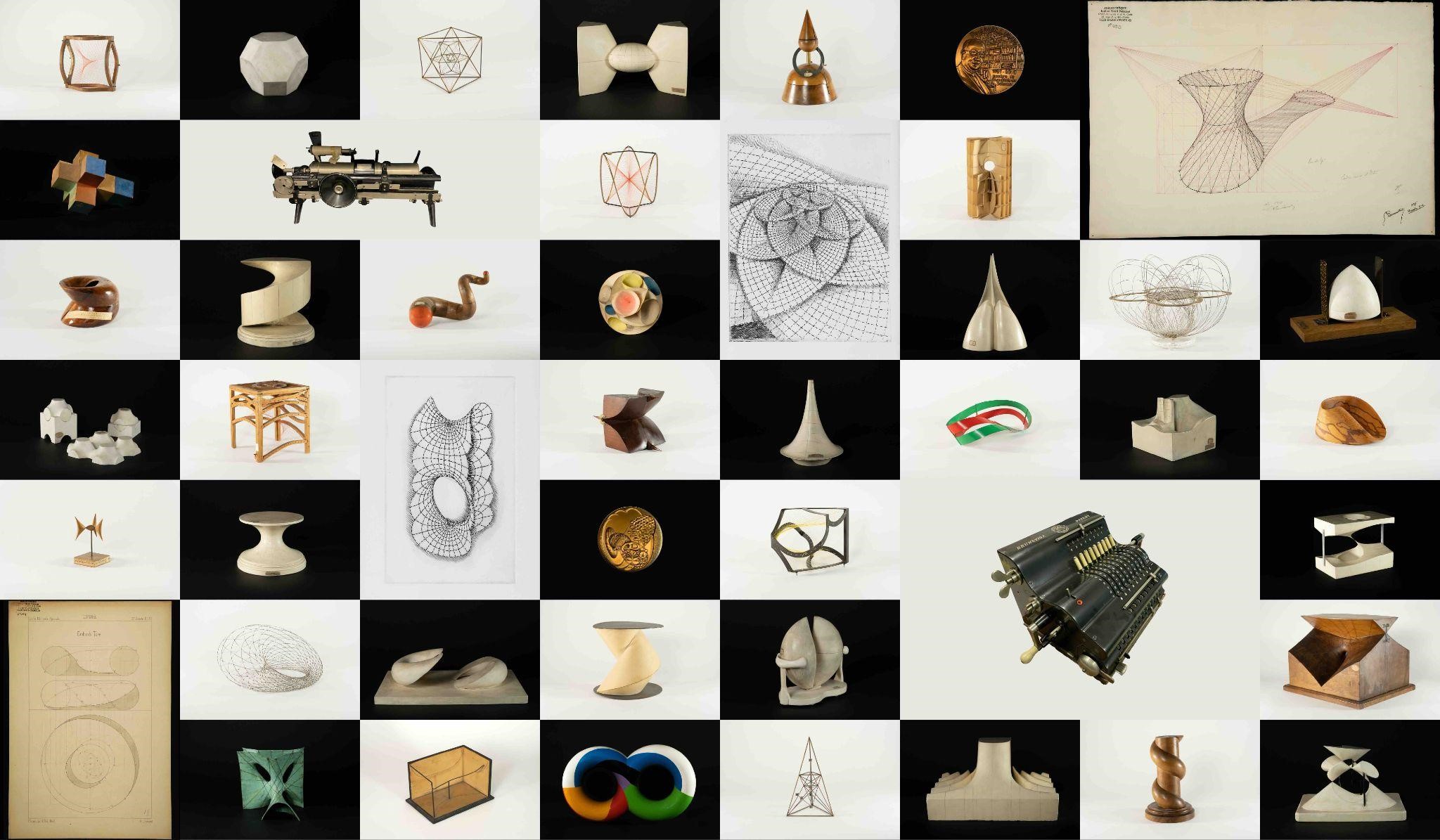
The Portail Math (Math Portal), an essential tool for scientists
The RNBM manages a knowledge base on licensing contracts, and is participating with Mathdoc in the creation of a new version of the Digital Library, which will provide access to online journals and to the list of paper journals available in libraries. Each identified scientist will thus be able to access the resources subscribed to by his or her tutelles. The joint management of paper and electronic collections guarantees virtually exhaustive coverage and optimum accessibility for the mathematical community.
The Cirm library
The Cirm library is recognized worldwide by many mathematicians. Located in an exceptional setting on the edge of Marseille's calanques, it boasts a rich documentary collection covering all areas of pure and applied mathematics. "We are fortunate to welcome more than 5,000 scientists every year to one of the 126 events organized at the Cirm, " explains Nathalie Granottier, head of the Cirm library. "They benefit not only from our spaces and services, but also from our vast collection of documentary resources ".
A redesign of the spaces was carried out in 2020. "Noting that uses of the library space were changing, we redesigned the library to offer differentiated spaces to meet all needs," Nathalie recounts. "We created collaborative work rooms, secluded spaces, comfortable lounges, we installed high and low tables, convivial spaces, a toy library, and chalkboards everywhere." Shelving was used to design these new spaces, complemented by specific furniture such as silent bubbles and an acoustic armchair. "Today, the library is always full," she enthuses. In addition, the library organizes exhibitions and events for schools and the general public to promote the image of mathematics. " We want to show just how exciting, lively and accessible mathematics can be," concludes Nathalie Granottier.
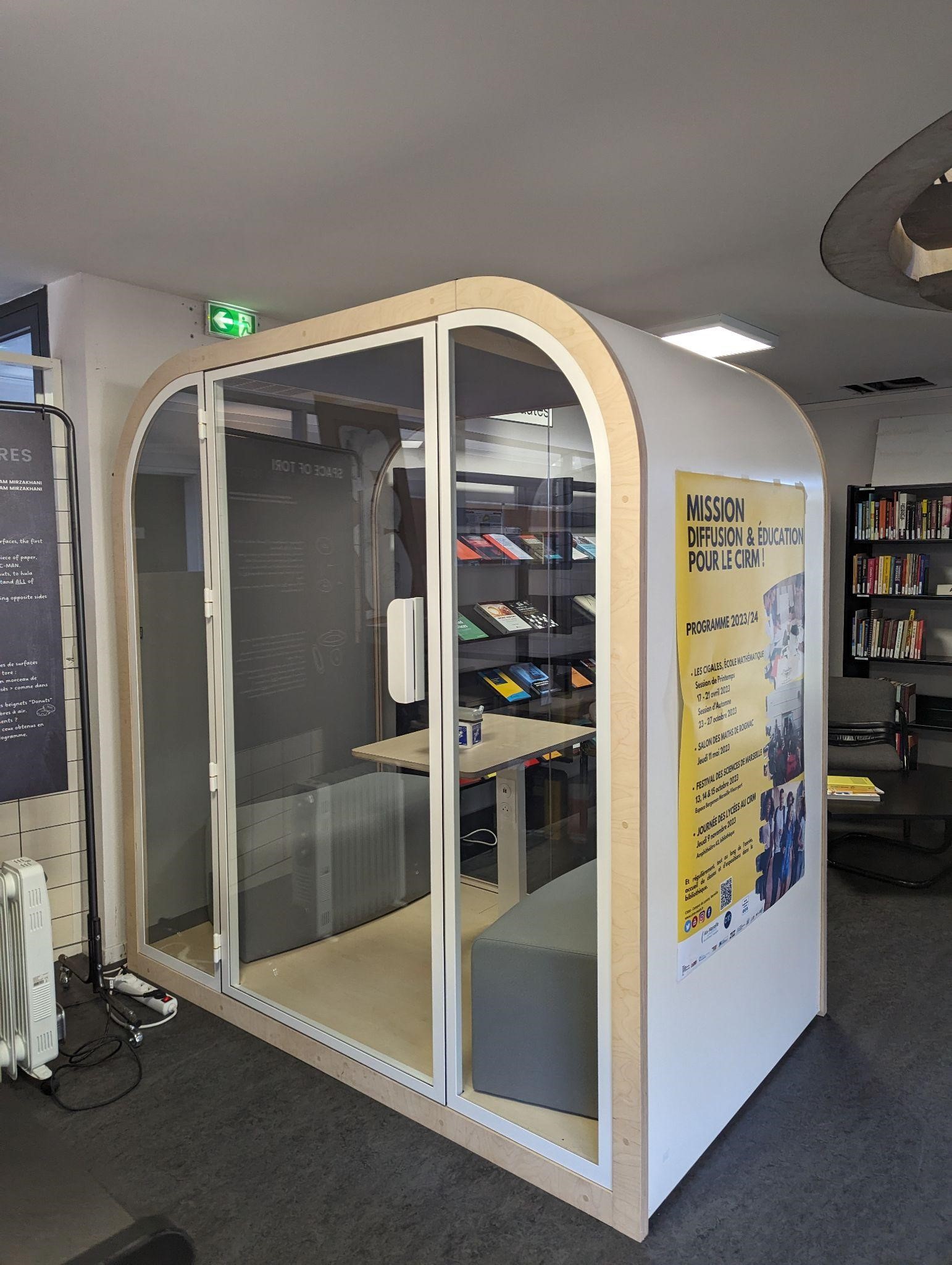
|

|
Carmin.tv, an audiovisual library for mathematics
Carmin.tv is the video platform dedicated to mathematics and its interactions, offering easy access to a multitude of resources. The Centre international de mathématiques pures et appliquées (CIMPA), the Cirm, the Institut des Hautes Études Scientifiques (IHES), the IHP and the SMF offer you videos of high-level conferences, courses and seminars. Carmin.tv offers an advanced search tool that lets you efficiently browse thousands of enriched videos and quickly find the content you need.
The Nancy library
Founded over a century ago, the Institut Élie Cartan de Lorraine (IECL) is a major French mathematics laboratory. The IECL library holds collections in pure and applied mathematics. It has a heritage archive linked to mathematician Jean Delsarte (1903-1968), an important figure in the history of mathematics in Nancy. A former dean of the Nancy Faculty of Science, co-founder and secretary of the Nicolas Bourbaki group of mathematicians, he was behind the creation of the Institut Élie Cartan in 1953. Shortly after moving into its new premises in 1995, the laboratory acquired this collection from Jean Delsarte's daughter. It includes texts by the mathematician, his collaborators and students, as well as documents on his life and photographs. The collection benefits from a high-quality inventory.
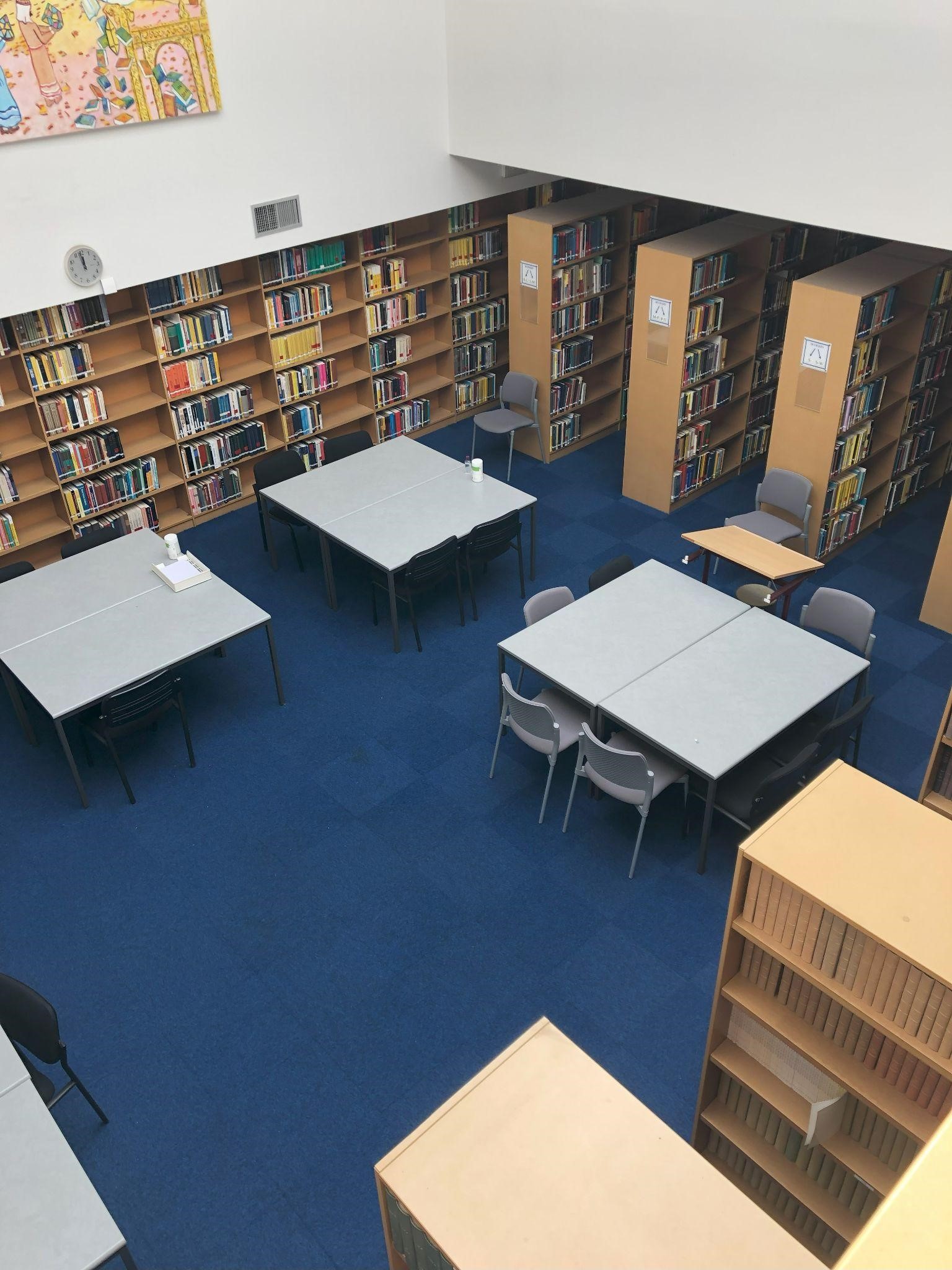
|
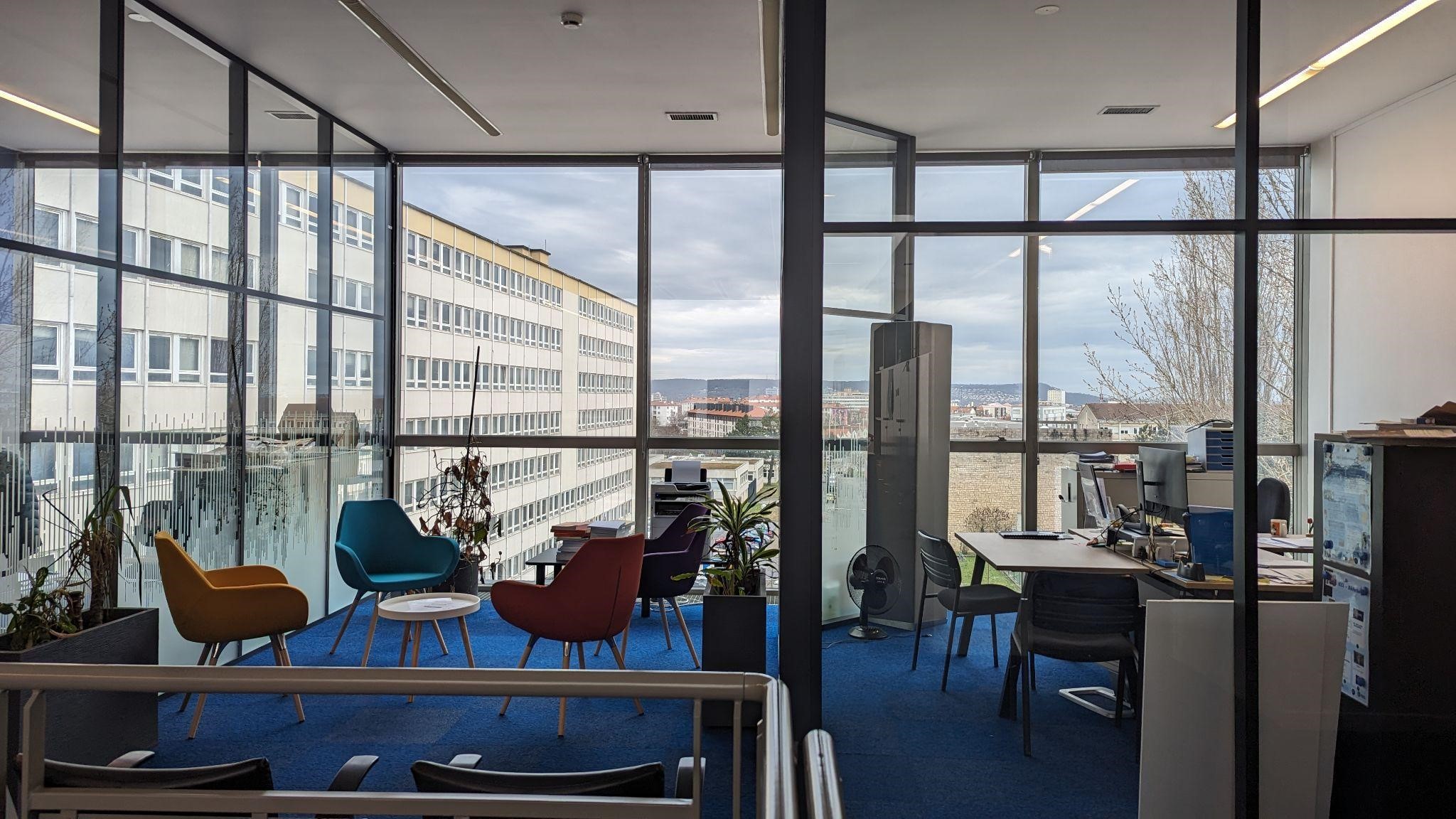
|
The Delsarte collection is a legacy and part of the laboratory's identity and history. The library's mission is to preserve these archives, and to promote and publicize them. As a result, since 2022, the collection has been listed in the Répertoire de fonds en Histoire et Philosophie des Sciences et des Techniques, which facilitates access and visibility. "I want to emphasize the value and accessibility of these archives," explains Valérie Mahut, head of the library. This involves presentations during student visits, exhibitions and mediation workshops, such as the scientific days organized for the laboratory's anniversary in 2023.
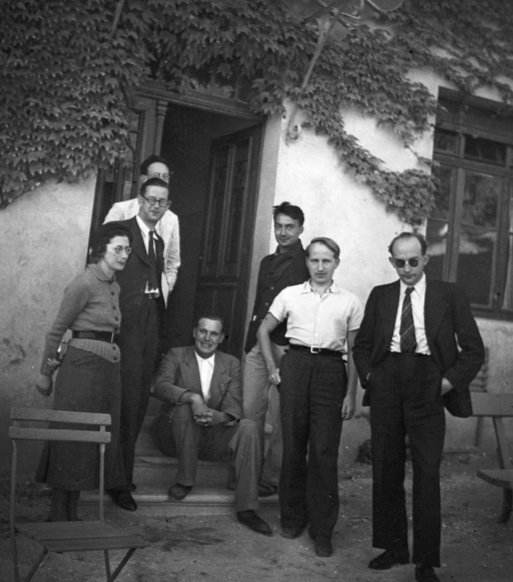
|

|
These scientific communication and mediation activities are organized at local and national level via the RNBM archives working group, sometimes in collaboration with historians of mathematics who are using this collection as part of a study project linked to the Bourbaki group archives.
The Bordeaux library
A number of RNBM mathematics libraries are bi-disciplinary. This is particularly true of the Bordeaux Mathematics and Computer Science Research Library (Bibliothèque de recherche Mathématiques et Informatique de Bordeaux - BMI), the result of a rich and interconnected historical proximity between these two scientific communities in Bordeaux. "At the end of the 1960s, what was simply an office library, supplied by researchers and shared naturally within the same unit, evolved with the region's academic institutions to better meet scientific requirements", explains Cyril Mauvillain, head of the BMI.
Like all RNBM libraries, the BMI has become formally structured over time, consolidating its collections and services. Today, it is one of the main sources of research support for mathematicians and computer scientists working at the Institut de Mathématiques de Bordeaux (IMB-UMR5251) and the Laboratoire Bordelais de Recherche en Informatique LaBRI-UMR5800), as well as for the young scientists affiliated with them.
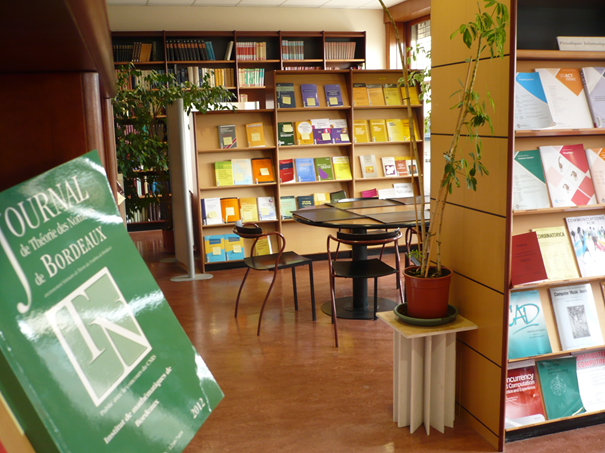
|
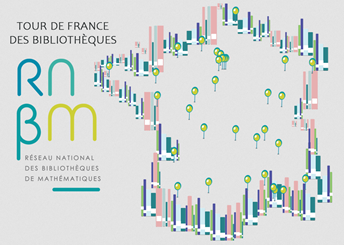
|
At the instigation of the RNBM Strategic Committee, Cyril Mauvillain and Filippo A. E. Nuccio Mortarino Majno di Capriglio, mathematician and Open Science referent at the Université Jean Monnet de Saint-Étienne, are highlighting the diversity and richness of the particularities of each mathematics library through a bimonthly webinar entitled the "Tour de France des bibliothèques". This webinar offers librarians and scientists in the network a platform to discuss issues specific to their libraries. The friendly, informal tone of these exchanges in no way detracts from the depth of the discussions and the sharing of know-how. "Each stage of the Tour strengthens cohesion within the network and develops documentary collaborations in the service of fundamental research", concludes Cyril Mauvilain.
Click & Read, instant access to full text
Click & Read is a browser extension (Chrome, Edge, Firefox, Safari) developed by CNRS that facilitates instant access to full text. Simply select the institutions and Open Access platforms to be tested to obtain direct or proxied links to the various sources. The list of institutional sources integrated into Click & Read is continually being expanded.
Conclusion
Mathematics libraries provide a place to work and consult close to the laboratories. They ensure that the documentary heritage is preserved and, with the help of scientists, that the collections are renewed and updated. " In mathematics, it is common to consult older documentary resources, much more so and further back in time than in the other sciences, which explains the particular attachment to documentation and its long-term preservation ", explains Djalil Chafaï, Scientific Director of the RNBM and professor at the Université Paris Sciences et Lettres. " Scientists sometimes have great difficulty accessing electronic resources, finding their bearings in publication methods, and frequenting libraries less and less, so they need to rethink. These are just some of the challenges facing the RNBM," adds Elisabeth Kneller.
